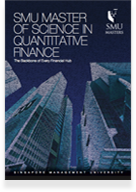
Even though he currently works as an Associate Professor of Quantitative Finance (Practice) and Academic Director of the Master of Science in Quantitative Finance at Singapore Management University (SMU), Tee Chyng Wen still refers to himself as a “tinkerer at heart”. This comes from the fact that he studied engineering for both his Bachelor’s degree and for his PhD at University of Cambridge.
“I enjoy trying things out, and really going through the nitty gritty of the subject matter at hand. So, if I'm not a ‘financial engineer’, I'll be an engineer of another discipline,” says full-time faculty member of SMU’s Lee Kong Chian School of Business (LKCSB).
So how did he end up teaching finance in the first place? Professor Tee explains: “I've always found the theoretical and modelling aspects of my research more interesting... In finance, the market itself is the "experiment", and you get all the data you can analyse provided to you directly.”
“To me, moving from engineering to quantitative finance just involved changing the variables we are modelling from electrons or photons into interest rates or stocks – the mathematical framework remains the same,” he adds.
When Professor Tee was about to complete his PhD, he came across many job openings from banks looking for quantitative analysts who would hire anyone with a PhD in hard sciences like engineering, physics, or computer science. So he poured countless hours and late nights studying the finance industry before applying for a several positions. Eventually, he ended up at Morgan Stanley’s fixed income division in London as a quantitative analyst working on exotic interest rate products.
Through his strong desire to learn and acquire knowledge in his fields of interest, Professor Tee successfully tackled the role by putting in extra work and effort.
“Graduate studies require a lot of commitment, as you are essentially making a conscious decision to step away from your career to pursue a higher degree. I learned to be self-driven and motivated. I also learned to be precise, and to take a rigorous approach to any project I'm working on,” he says.
One important lesson he has learned over time is how specialised skillsets or knowledge can get commoditised. He brings up how banks would poach quantitative analysts from one another in the 1990s and early 2000s to get hold of the quantitative models used in pricing and hedging. Because of this, any quantitative analyst’s employability was directly tied to the number of models they helped implement from scratch.
“What happened next was that analytics vendors like Numerix and Murex started offering these models, and then there was no need for every institution to reinvent the wheel anymore. At the end of the day, it is how you use these models, and your understanding of their limitation, that matter the most,” he describes.
In short, it simply isn’t enough to know or possess a specialised skillset that can be acquired by any individual. In order to stand out from the masses, one needs to know how to apply these skillsets and knowledge to current-world situations and advancements.
Professor Tee believes that SMU has the right curriculum and academic pathway to prepare students for the real world. He believes that it is not just about students getting good grades, but also the ability to demonstrate in-depth understanding and application of what they have learnt.
When it comes to getting jobs in prominent companies, his advice is simple: “Prepare well for the interview. Grades matter, but ultimately it is how you present yourself at the interview that clinches jobs.”
One way to prepare for an interview is to “mentally compartmentalise your knowledge, so that when the interviewer asks you a technical question, you can quickly map it to a cluster of tools that is relevant.”
Another tip is to keep up with the financial market. He says: “Read good financial press, like Financial Times or Wall Street Journal, as a habit… Students sometimes get the wrong impression that they can answer market-related questions just by spending five minutes the day before the interview to check the S&P Index and a few other major stocks' closing prices. It's never going to be so simple!”
Speak to our Admissions Advisors
Lee Kong Chian School of Business
Postgraduate Admissions
Singapore Management University
Lee Kong Chian School of Business
Graduate Programmes Office, Level 4
50 Stamford Road, Singapore 178899
Tel: +65 6828 0882
Join us at the upcoming events
Gf, Ramanashree Arcade, Kids Kemp, No 18, Mahatma Gandhi Rd, Craig Park Layout, Ashok Nagar, Bengaluru, Karnataka 560001
Via Gerolamo Cardano, 1, 20124 Milano MI, Italy
1 Raffles Drive, Makati Avenue, 1224, Makati City
